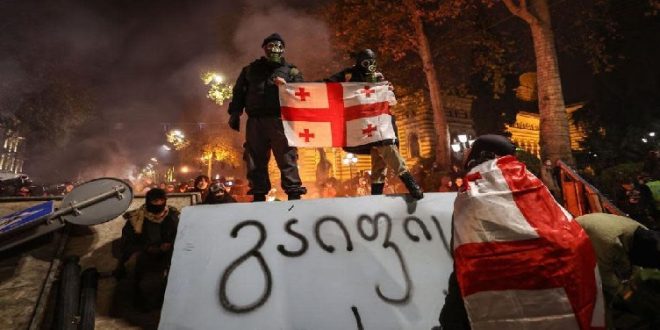03-12-2024
TBILISI: Georgia has seen a fourth night of street demonstrations and a string of public resignations, triggered by the ruling party’s decision to suspend a push to start talks on joining the European Union.
As tens of thousands of Georgians headed back to the streets of several cities, Prime Minister Irakli Kobakhidze said they had fallen victim to opposition lies and he rejected calls for new elections.
 He confirmed reports that Georgia’s ambassador to the US, David Zalkaliani, had become the latest senior diplomat to stand down, explaining that he had come under considerable pressure but Kobakhidze sought to deny the reason for the protests, saying on Sunday that “we have not suspended anything, it’s a lie”.
He confirmed reports that Georgia’s ambassador to the US, David Zalkaliani, had become the latest senior diplomat to stand down, explaining that he had come under considerable pressure but Kobakhidze sought to deny the reason for the protests, saying on Sunday that “we have not suspended anything, it’s a lie”.
Only three days before, his party Georgian Dream had accused the EU of using talks on joining the union as “blackmail” and said the government had decided not to put that issue on the agenda until the end of 2028.
Pro-EU protesters were out in big numbers again on Sunday night, and when fireworks were aimed at the parliament building as well as riot police, the police responded with water cannon. Large groups of riot police huddled in side streets beside parliament, and it was not until late into the night that reports emerged of clashes with demonstrators.
Georgia’s increasingly authoritarian government has been accused by the EU and US of democratic backsliding. On Saturday, the US took the significant step of suspending its strategic partnership with Georgia.
Kobakhidze insisted that Georgian Dream was still “committed to European integration… and we are continuing on our path to the European dream” and yet an increasing array of public officials do not appear to believe that is the case. Several ambassadors have resigned, and hundreds of civil servants and more than 3,000 teachers have signed letters condemning the decision to put EU accession on hold.
Many Georgians have been shocked by the level of violence directed at Georgian journalists as well as protesters. Dozens of reporters have been beaten or pepper sprayed and some have needed hospital treatment.
 Georgia’s human rights ombudsman Levan Ioseliani said “this is brutality”, and he appealed to police not to abuse their power.
Georgia’s human rights ombudsman Levan Ioseliani said “this is brutality”, and he appealed to police not to abuse their power.
The prime minister said it was opposition groups and not the police that had meted out “systemic violence”.
Georgian ex-ambassador to the EU Natalie Sabanadze, now at Chatham House in the UK, believes the level of violence, the string of resignations and civil disobedience indicate a “qualitative change” to the protests now taking place.
“Maybe (the government) thought people would be scared but it’s not working out like this,” she told media. “Yesterday civil society activists and artists went to the public broadcaster and took it over and forced their way into the live stream. I’ve seen this before, in pre-revolutionary Georgia (in 2003).”
Georgia’s pro-Western president, Salome Zourabichvili, is due to step down in a matter of weeks, however since last month’s contested parliamentary elections which opposition parties have denounced as rigged, she has become a powerful figurehead, rallying protesters against the government and calling for a new vote.
She and the protesters accuse the government of aiming to drag their country back into Russia’s sphere of influence, even though an overwhelming majority of the population backs joining the EU.
Georgia has a population of some 3.7 million and 20% of its territory is under Russian military occupation in two breakaway regions. (Int’l Monitoring Desk)
 Pressmediaofindia
Pressmediaofindia




